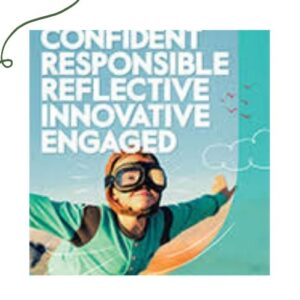The world is changing faster than ever. Our little ones are growing up in a digital age where screens are ubiquitous and artificial intelligence (AI) is becoming increasingly integrated into our lives.
As parents, it’s natural to wonder: Will all this technology, particularly screen-based learning and AI tools, harm my child’s critical thinking skills and overall mental and academic development?
Is a valid concern, and one that many countries are now taking seriously?
Nations like Germany, France, and Australia are increasingly recognizing the importance of minimizing/substituting screen time, particularly for younger children, and promoting traditional learning methods. This blog post explores the potential impact of digital learning and AI on our children, emphasizing the crucial role of minimizing screen exposure and prioritizing foundational skills like reading and writing.
SO NO SCREENS & AI – FOR YOUNGER CHILDREN?
The Early & Younger Years: Building a Strong Foundation (Screen-Free):
The first few years of a child’s life are extremely critical for brain development – and builds the foundations for life long. Extensive research suggests that excessive screen time during this period can hinder cognitive development, impacting attention span, language acquisition, and social-emotional skills. Many experts, and countries like those mentioned above, advocate for minimizing/eliminating screen time, ideally to near zero, up to age 12 or 13. This allows children’s brains to develop naturally through play, exploration, and human interaction.

Why Minimize Screens for Young Children?
Young children learn best & develop mental faculties (e.g., mental maths – so important in life) through hands-on experiences, active play, and real-world interactions & physical engagements. These activities stimulate their senses, encourage creativity, and foster critical thinking skills. Excessive screen time & digital learning in these years can displace these essential activities, potentially leading to developmental delays, mental development lags and attention problems. Furthermore, the rapid pace and flashing images on screens can overstimulate young brains, making it difficult for them to focus and concentrate.
Digital media is now considered to be addictive – and doctors /social scientists are now increasingly flagging concerns.
The Power of Paper and Print:
Reading paper books and writing by hand on paper are fundamental skills that are essential for academic success and cognitive – brain development. These activities promote literacy, enhance vocabulary, reflection and improve critical thinking & numerous mental skills/abilities. The act of physically writing helps children develop fine motor skills and strengthens the connection between the brain and hand & develops the brain the right way. Unlike the passive experience of watching a screen, reading and writing require active engagement and critical thinking. They encourage children to process information, analyze ideas, and form their own opinions.

Dear parent – try a simple test – of writing your “to do” list by hand on a paper pad – and notice how your own retention /recall is better.
The Double-Edged Sword of Digital Learning (Later Years):
While minimizing screen time is crucial for younger children, digital tools can play a good role as an illustration/understanding too in education as children grow older and become adults. Interactive apps, educational videos, and online resources can supplement traditional learning methods and make learning more engaging.
However, even in older children, balance and quality are key. Mindless scrolling, passive video watching, and exposure to age-inappropriate content can be detrimental – as more and more research /data is indicating – the dangers of digital addiction.
The emerging scourge of mental illness – now often getting reported – is also due to too much digital engagement.
The AI Factor…..its new….Proceed with Caution:
AI is rapidly transforming society and while new is already entering education – offering personalized learning platforms and AI-powered tutors. While these tools can be beneficial, they also pose challenges…its so new….so its real impact will be established/visible only after a few years. Our assessment is that over-reliance on AI can hinder children’s ability to think critically and solve problems independently. It’s crucial to ensure that AI is used as a tool to support learning, not replace it entirely. Remember the BYJU’s disaster?
So, What should a Parent Do?
• Prioritize the Early Years: Minimize screen time for young children, focusing on play, exploration, and real-world interactions.
• Embrace Books and Writing: Encourage reading paper-based books and writing from an early age. Make it a part of your daily routine.
• Be Mindful of Screen Time (for Older Children): Set clear limits on screen time and prioritize other activities. For younger children – no screens please.
• Curate Content Carefully: Choose high-quality educational apps, videos, and websites that are age-appropriate.
• Engage Actively: Discuss what your child is learning and ask open-ended questions.
• Foster Critical Thinking: Encourage questioning, analysis, and independent thinking.
• Embrace the Real World: Provide opportunities for real-world exploration and interaction.
• Stay Informed about AI: Track – so let’s fully understand the potential benefits and challenges of AI in education.
• Avoid : schools who are somehow using laptop based schooling from grade 1 onward ???

HOW DO DIGITAL SCREENS REALLY DAMAGE?
Here’s a breakdown of how too much digital engagement can contribute to mental health issues:
1. Displacement of Crucial Activities: Too much screen time often displaces activities that are essential for mental well-being, such as:
• Physical Activity: Sedentary screen time can lead to a lack of exercise, which is crucial for mood regulation, stress reduction, and overall mental health.
• Face-to-Face Social Interaction: Meaningful social interactions are vital for developing social skills, building empathy, and fostering a sense of belonging. Excessive digital communication can sometimes replace these real-world connections, leading to feelings of isolation and loneliness.
• Creative Play and Exploration: Unstructured play and exploration are essential for cognitive and emotional development. When children spend too much time on screens, they may miss out on these valuable experiences.
• Sleep: The blue light emitted from screens can interfere with melatonin production, a hormone that regulates sleep. Poor sleep can contribute to mood swings, irritability, anxiety, and depression.
2. Cyberbullying and Online Harassment: The digital world can be a breeding ground for cyberbullying, which can have devastating effects on a child’s mental health. Constant harassment, humiliation, and spreading of rumors online can lead to anxiety, depression, and even suicidal ideation.
3. Social Comparison and Body Image Issues: Social media platforms often present a curated and often unrealistic view of others’ lives. Constant exposure to these idealized images can lead to social comparison, feelings of inadequacy, and body image issues, particularly in adolescents who are already vulnerable to these pressures.
4. Fear of Missing Out (FOMO): The constant stream of updates and notifications on social media can create a sense of FOMO, making individuals feel like they are missing out on important events or experiences. This can lead to anxiety, stress, and a constant need to check their devices.
5. Addiction and Dependence: Some individuals can develop an addiction to digital devices and social media, spending excessive amounts of time online despite negative consequences. This can lead to problems with school, work, and relationships.
6. Attention and Focus Issues:
The constant barrage of information and notifications on digital devices can train the brain to crave stimulation and make it difficult to sustain attention and focus on tasks that require deeper concentration. This can contribute to attention deficit hyperactivity disorder (ADHD) or exacerbate existing symptoms.
7. Anxiety and Depression: Studies have shown a correlation between excessive screen time and increased rates of anxiety and depression in children and adolescents. While the exact causal relationship is still being investigated, it’s clear that there is a link between these factors.
It’s important to note: Not everyone who engages with digital technology will experience mental health problems. However, the risks are real, and it’s essential for parents, educators, and policymakers to be aware of these potential downsides and take steps to mitigate them.
https://www.medicoverhospitals.in/articles/impact-of-screen-time-on-physical-and-mental-health
AGAIN – WHAT CAN PARENTS DO?
• Set limits on screen time: Establish clear rules about how much time children can spend on digital devices and what types of content they can access.
• Create screen-free zones: Designate certain areas of the house, such as the dinner table or bedrooms, as screen-free zones.
• Encourage other activities: Promote activities that foster physical activity, social interaction, creativity, and real-world exploration.
• Talk to your children: Have open and honest conversations about the potential risks of excessive digital engagement and encourage them to be mindful of their online behavior.
• Model healthy technology habits: Be aware of your own screen time and demonstrate responsible technology use. They emulate us – so we have set an example – daily.
• Seek professional help: If you are concerned about your child’s mental health or their technology use, don’t hesitate to seek professional help from a therapist or counselor.
Here’s a credible report on the Australia Ban.
https://www.reuters.com/technology/australia-passes-social-media-ban-children-under-16-2024-11-28/
Similar reports exist for Germany & France too, as in many other societies.
The key is to remember that human connection, hands-on writing & learning, and a love of reading are the cornerstones of a child’s education.
We are therefore a no screens school – uptill primary grades !
We hope this helps you, dear parent!
Do you have any comments on this subject or suggestions/specific thoughts or questions about your child’s interests in sports?
Please feel free to share your thoughts in the comments below.
Meanwhile enjoy developing your child at home and outdoors
There are some great parks/green spots/sports fields near at as well near our school campuses – consider locating a suitable one in your neighbourhood, for encouraging physical activity – the seeds of any sports – near say:
o SouthCity1
o Sector31
o Sector40
o Sushant Lok
o Sector72
o Sector70
o Sectot71
o Sector48
o Badshahpur corridor*
o Leisure Valley
(*) which is right next to the Sixth Element – Tata Primanti campus – and the trees there near our school’s north/east boundary – help filter our school campus air too.
why – the Sixth Element School?
Very simply, the Sixth Element was a phrase coined by the school founders 20 years back, to illustrate igniting the joy of learning – so important for children’s development – as we nurture, and get them ready for the future.
How to Foster a Well-Rounded Child?
While there is lots of operating structure and detailed SOPs in school’s daily /weekly/monthly/annual – schedules – “how” the same is executed is unique – i.e., the
Sixth element way of incorporating co-curricular & scientific & artistic activities, project work etc – leading to children enjoy learning & look forward to coming to school each day (and interestingly they do miss school on holidays 😊 ! )

Some examples of what’s done on instilling values & character building:
• Instil values: Understanding differences between right or wrong, is discussed in its many facets often. As also discussing environmental issues, volunteering for community activities, clean-ups, and respecting all living beings.
• Values as a Compass: Values are the moral principles that guide our actions. The Cambridge International Curriculum, with its emphasis on global citizenship and community service, fosters values like respect, empathy, and responsibility
• Embrace sustainability: Reduce waste, conserve energy, and grow your own food together. Encouraging minimalism (BTW we are a uniform school), up-cycling, gardening, and exploring green technologies like rain water harvesting, recycling, etc
• Building Confidence: The curriculum’s focus on individual & team achievement (over experiential projects in small groups) and overcoming difficulties – and making progress, encouraged by the teacher helps build self-esteem. By setting and achieving goals, students develop a strong sense of confidence and resilience
• Life Skills for Real World: The curriculum’s focus on independent learning, critical thinking, and problem-solving equips students with essential life skills.
These skills are invaluable in navigating challenges and opportunities- building confidence
THE SIXTH ELEMENT School’s commitment to sustainability?
At the Sixth Element, we believe that education should go beyond classrooms. Our green airy, spacious campuses are a living laboratory, where children learn experimentally about sustainable practices. From solar panels to rainwater harvesting, recycling & near no plastics usage.
Our curriculum integrates sustainability into every subject, fostering a deep appreciation for nature, science, commerce & the arts – while instilling a desire to protect our planet.
By igniting the joy of learning, nurturing curiosity, confidence, values, and environmental consciousness – we empower children to become not only successful individuals, but equally responsible members of society and global citizens.
Does a unique International Curriculum School like the Sixth Element help?
A progressive holistic school following Cambridge International Curriculum significantly contributes by lots of experiential learning and project-based work.
The Sixth Element School: Where Cambridge International meets India- in an exclusive, low density, impactful format.
Reason why we chose Cambridge International curriculum is because the blend of teacher directed as well as learner self-driven learning & research seems to be relevant for aspirational kids from Indian families, keen on preparing their kids to be global citizens of the future – weather based in India or overseas.
Is the Sixth Element School duly registered with Cambridge International?
Yes, The Sixth Element School – is duly registered as one of over 10,000 schools globally – as a Cambridge International school with a global registration number IA 892
Keen to see what a unique school like The Sixth Element School offers? Schedule a visit and see for yourself why it could be the perfect launchpad for your child’s bright, global future!
We started the first sixth element school 20 years back in 2004 @ Gurgaon.
Our schools & afternoon extended school & afternoon ‘activities enriched’ daycare centers are unique, exclusive compact neighborhood green campuses – where a lot of outdoor activities & experiential learning (physical – not digital) takes place with children on most days.
Our unique Smaller campus – with only 2 sections per each class grade – and very limited children on campus, allow us to focus on each child’s growth & development properly.
We are proud of our high quality, committed teachers – the very backbone of any good learning environment.
We raise well-rounded future ready individuals who are prepared to face the challenges of the world with confidence and integrity – with the right methods and practices. As an example – our foundational fitness program delivered in partnership with xfit kids , our gym, our green playgrounds and great coaches – give a great foundational fitness and start to our school kids.
CONCLUSION:
Protecting our children’s cognitive development requires a balanced approach. While technology can be a valuable tool, it’s crucial to prioritize foundational skills like reading and writing and minimize screen time, especially in the early years. By fostering critical thinking, embracing the real world, and using technology thoughtfully, we can equip our children to thrive in the digital age without compromising their mental and academic well-being.
A good understanding and partnership between parents and schools is key to nurturing the future leaders of gurugram, our great nation and our planet.
THE SIXTH ELEMENT SCHOOL WE BELIEVE IN THE IMPORTANCE OF CATALYSING & ENSURING “THE SIXTH ELEMENT – i.e. THE JOY OF LEARNING ” FOR EVERY CHILD. OUR CURRICULAM IS BENCHMARKED WITH THE BEST INTERNATIONALLY, WHILE DRAWING FROM OUR VERY OWN CORE ANCIENT INDIAN BEST PRACTICES SUCH AS THE GURU SHISHYA PARAMPARA) & VALUES. THANKS TO ITS 20+ YEARS EXPERIENCE AND ITS CORE CHILD DEVELOPMENT PRACTICES DRAWN FROM PIAGET, VYGOSTKY AND BRUNER – WHICH IS INCIDENTALLY THE RESOURCE POOL – FOR THE FOUNDATIONAL YEARS SCHOOL CURRICULUM OF THE UPGRADED NEW EDUCATION (NEP) UNDER ROLL OUT IN INDIA NOW.
So in line with some of India’s top and globally the very best : we are now a unique 100% Cambridge International School.
the Sixth Element School
the school children love
SOUTH CITY 1. TATA PRIMANTI (sector 72)
85272-74695 or 97736-32626
since 2004(20 years)
limited enrollment available in pre-NURSERY, NURSERY, KG & DAYCARE, grade 1 now – in our prenursery to K12 school programs.
@ Gurgaon’s only single section “exclusive” boutique VENTILATED, AIRY, SPACIOUS. GREEN SCHOOL CAMPUSES





